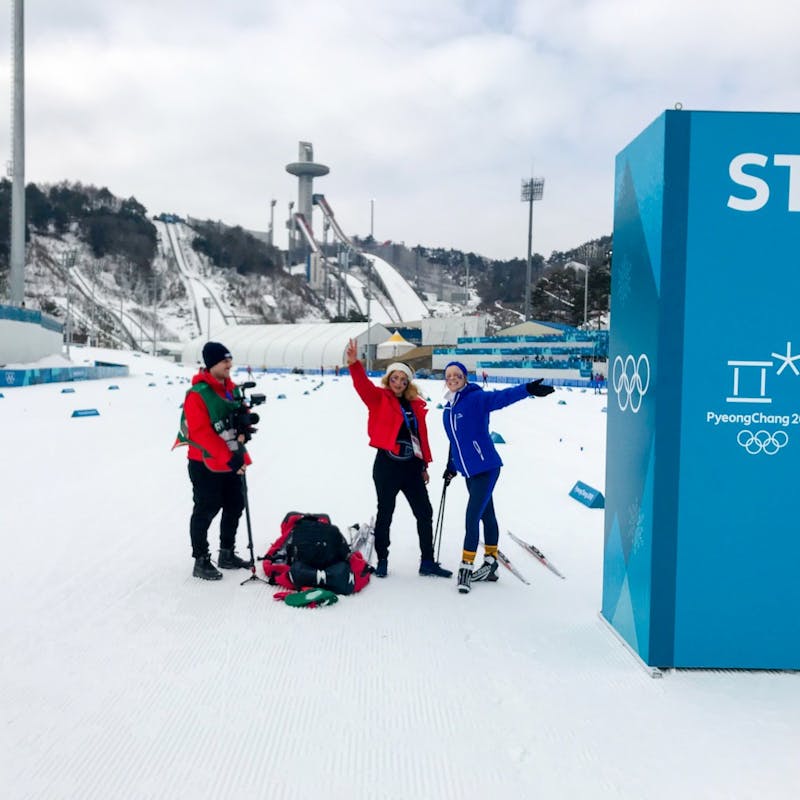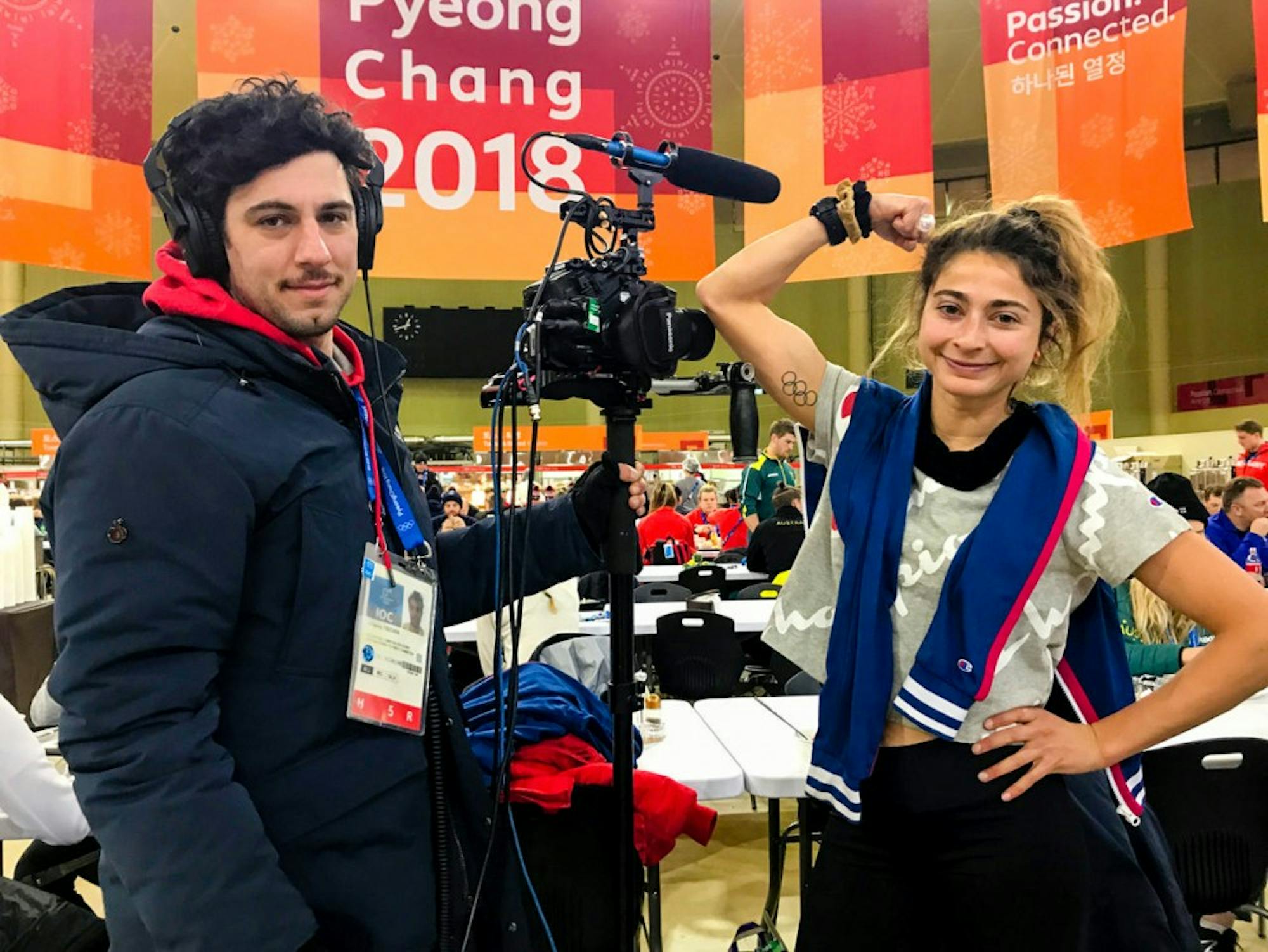Years after meeting in the basement of a Dartmouth fraternity, Alexi Pappas ’12 and Jeremy Teicher ’10 embarked on an Olympic journey unlike any other. After the president of the International Olympic Committee happened upon the couple’s first feature film “Tracktown” during a flight, they were chosen to participate in the Olympic Art Project during the 2018 Pyeongchang Games.
Teicher and Pappas, the latter of whom represented Greece at the 2016 Rio de Janeiro Games, decided to create a series of five episodic shorts that details the Olympic experience through an Olympian’s point of view. The series, “Olympic Dreams,” was recently released and is now available online.
The series depicts the experiences of Penelope, a young cross-country skier played by Pappas, as she competes for the first time at the Olympic games. Pappas and Teicher collaborated with comedian Nick Kroll, who plays a volunteer dentist named Ezra in “Olympic Dreams,” to write and film the shorts. Drawing upon Pappas’s experiences as a competitor at the 2016 Games, experiences of winter Olympians interviewed by the team and Teicher’s experiences as an observer, the team crafted a story that focuses not only on the glory and magic of the Olympics but also on its day-to-day aspects.
Pappas and Teicher were granted access to training facilities and other locations in the Olympic Village that had never been filmed prior to the development of their project. They took advantage of this opportunity to create a full-bodied picture of Olympic life.
“People can see a medal ceremony, interviews and stories about the top couple of athletes, but there are thousands of other athletes and stories … that allow the viewer to peek into a window of a world they might not have seen otherwise,” Teicher said.
The main story told in “Olympic Dreams” focuses on Penelope, documenting her experiences from the opening ceremonies to the closing ceremonies. Awed and excited to be part of her first Olympics, Penelope finishes outside the top positions in her first and only race. It’s a rare snapshot of the inevitable disappointment of many Olympians who do not make it to the podium despite working nearly their entire lives to reach the Games. The feeling fades, however, as Penelope realizes how lucky she is to be surrounded by similarly-minded people who have dedicated their lives to a sport. Along the way, “Olympic Dreams” gives viewers an all-access pass into the lives of Olympians in the Olympic Village, from the dining halls to the laundry room to the leisure stations where Olympians are seen battling it out on the air hockey tables.

The series also follows Ezra as he navigates his way through the Olympic village — not as an athlete, but as an observer and volunteer dentist. Ezra’s story serves to introduce viewers to a wide variety of Olympians, such as freestyle skier Nico Porteous, bronze medalist in the men’s halfpipe at the Pyeongchang Games, as they sit at his dentist’s chair and make conversation with him. Finally, Ezra and Penelope meet, and sparks fly as they travel through the Olympic village and the city of Pyeongchang, experiencing the culture, food and nightlife.
Wandering around Pyeongchang and the Olympic Village to film, Pappas and Teicher used their Dartmouth connections to work with Chinedum Nwaigwe ’19 in the editing process. Nwaigwe worked closely with Pappas and Teicher while she was on the film studies domestic study project in Los Angeles, editing footage for Pappas’s behind-the-scenes vlog from the Olympic village.
“Alexi and Jeremy would give me footage along with a narrative they wanted me to use, and I would sit and edit their footage for them while choosing parts I thought were important for their overall story,” Nwaigwe said.
Pappas and Teicher had two goals for the “Olympic Dreams” series: to capture a side of the Olympics that people had never seen before and to create an indie film that could stand on its own.
“Jeremy and I make a great team, and I think both of us had the background to tell a very unique story,” Pappas said.
Pappas and Teicher hope that this series will shed more light on what Olympic life is actually like, apart from the glories of medaling.
“I think we deepen people’s appreciation for the Olympics and create more empathy [for] the Olympic experience — you can understand what it’s actually like to be there,” Teicher said.

Weaving their respective realities into a fictitious story, Teicher and Pappas found their experiences as observer and Olympian to be pivotal in creating the story and choosing which aspects of Olympic life to highlight. Pappas believes that her experiences as an Olympian were particularly important in constructing a narrative that felt real and authentic.
“It’s fun for me as an Olympian to represent the Olympic world in a way that would make other Olympians proud … I wanted the film world to view it as a great standalone movie, but it was also important that I wasn’t a non-athlete trying to capture that experience,” she said.
By including a roster of real Olympians, like American freestyle skier Gus Kenworthy, Pappas and Teicher hoped to create a standalone indie film similar to “Tracktown.”
“Hopefully, people who might not necessarily be interested in the Olympics would still want to watch it simply because it’s a good story,” Teicher said.
Though Pappas and Teicher have more creative projects in the offing, including a full-length movie made from the raw leftover footage of “Olympic Dreams,” their focus may be elsewhere for the time being. After years of romantic and creative partnership, the couple is getting married early next month.




